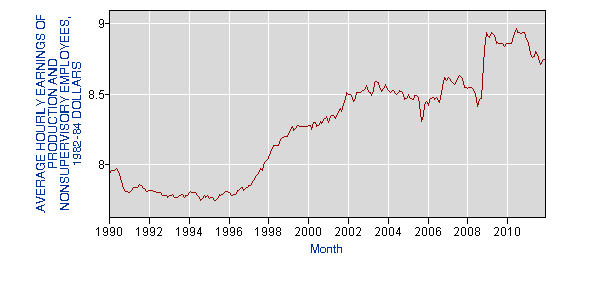January 22, 2012
Ezekiel Emanuel told readers of the necessity of controlling health care costs in order to allow workers to see real wage growth and to free up spending for other areas of the budget. To make this case he comments:
“During those 30 years [1980-2010], the only sustained period when real hourly earnings increased was 1990 through 1998 — which coincided almost exactly with a period of unusually low increases in health care costs.”
That is not what the data from the Bureau of Labor Statistics show. In fact, there was essentially no real wage growth from 1990 to 1996. However, wages grew at a healthy rate from 1996 to 2001. The major factors behind the stronger wage growth of the late 90s were the uptick in productivity growth beginning in the middle of 1995 and the low unemployment rate in the years 1996-2001.

Source: Bureau of Labor Statistics.
It is also worth noting that in discussing ways to control costs, Emanuel never mentions increased trade. Every other country in the world pays far less for their health care than the United States even though they have comparable outcomes. This suggests the possibility for large gains from more trade. Unfortunately, discussions of health care policy are dominated by protectionists who do not want to see the industry exposed to increased international competition.







Comments